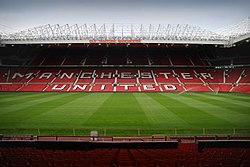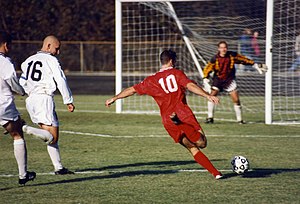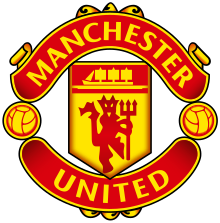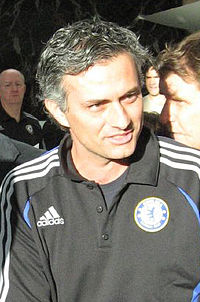José Mourinho
José Mário dos Santos Félix Mourinho (wym.
[ʒuˈzɛ moˈɾiɲu], uproszczona polska /żu
ze mo
riniu/; ur.
26 stycznia 1963 roku w
Setúbal) –
portugalski trener i były
piłkarz. Prowadzi klub
hiszpańskiej Primera División,
Real Madryt. Nazywany czasem "The Special One". Tytuł ten wymyślił sam Mourinho, a później został on podchwycony przez brytyjskie media
[2].
Mourinho jest synem byłego portugalskiego bramkarza
Félixa Mourinho
i tak jak ojciec postanowił spróbować sił jako piłkarz, jednakże nie
odznaczał się zbyt wielkimi umiejętnościami i szybko zakończył karierę.
Początkowo pracował jako asystent w
Estreli Amadora, a później
FC Porto. Na początku lat 90. Portugalczyk został tłumaczem trenera
FC Barcelona sir
Bobby'ego Robsona.
W 2000 roku podjął pierwszą samodzielną pracę jako trener i zaliczył udane okresy pracy w
SL Benfica i
União Leiria. W 2002 roku powrócił do Porto, tym razem jako trener i już w pierwszym sezonie zdobył z tym klubem
mistrzostwo Portugalii,
Puchar Portugalii oraz
Puchar UEFA.
Rok 2004 zakończył z jeszcze lepszymi wynikami. Porto obroniło tytuł
mistrzowski i wygrało najważniejsze futbolowe rozgrywki w Europie,
Ligę Mistrzów.
W 2004 roku Mourinho przeniósł się do angielskiego
Chelsea FC, z którą dwukrotnie, w 2005 i 2006 roku, zdobył
mistrzostwo Anglii
oraz kilka innych krajowych trofeów. Często udzielał kontrowersyjnych
wypowiedzi oraz wywiadów, lecz swoimi wynikami udowadniał, że należy do
światowej czołówki szkoleniowców. W sezonach 2004/05 i 2005/06
Międzynarodowa Federacja Historyków i Statystyków Futbolu (IFFHS) uznała go za najlepszego trenera na świecie.
Po serii słabszych wyników Mourinho został zwolniony i przed sezonem 2008/09 podjął się pracy we włoskim
Interze Mediolan, z którym podpisał trzyletni kontrakt. Już po trzech miesiącach pracy zdobył swoje pierwsze trofeum,
Superpuchar Włoch, zaś całe rozgrywki 2008/09 zakończył z tytułem
mistrzowskim.
W następnym sezonie jako pierwszy menadżer w historii Włoch zdobył
potrójną koronę, czyli wygrał ligę, krajowy puchar oraz Ligę Mistrzów.
Stał się również trzecim menadżerem w historii futbolu, który dwukrotnie
wygrał
Ligę Mistrzów z dwoma różnymi zespołami. Wcześniej dokonali tego tylko
Ernst Happel i
Ottmar Hitzfeld.
28 maja 2010 roku, Mourinho objął drużynę
Realu Madryt, podpisując z
królewskimi 4-letni kontrakt, stając się jednocześnie najlepiej zarabiającym trenerem świata.
Kariera szkoleniowa
Szybko zrezygnował z kariery piłkarskiej i z zamiarem zgłębiania warsztatu trenerskiego wyjechał do
Anglii. Po powrocie do kraju przez dwa sezony pracował jako asystent i trener młodzieży. Dobra znajomość
języka angielskiego pozwoliła mu na rozpoczęcie współpracy z
Bobby Robsonem, najpierw w
Sportingu i później – z dużo większym powodzeniem – w
FC Porto i
FC Barcelona. Ich największe sukcesy z tego okresu to dwa tytuły mistrza
Portugalii oraz po jednym Pucharze i Superpucharze tego kraju. W Barcelonie Mourinho już przy boku następcy Robsona
Holendra Louisa van Gaala wywalczył także dwukrotnie mistrzostwo
Hiszpanii.
W 2000 roku objął posadę pierwszego trenera
Benfiki, ale po miesiącu został wyrzucony po kłótni z prezesem. Do młodego szkoleniowca nie zrazili się jednak działacze
União Leiria.
W 2001 roku zaproponowali mu pracę, która zakładała szeroką autonomię w
podejmowaniu decyzji. Właśnie w Leiria Mourinho odniósł swój pierwszy
sukces – ligowego średniaka doprowadził do trzeciego miejsca w lidze i
wywalczył awans do rozgrywek
Pucharu UEFA.
Niedługo później został szkoleniowcem
FC Porto
i w ciągu zaledwie dwóch lat z dotychczasowego lidera jedynie na
krajowych boiskach, uczynił najlepszą drużynę Starego Kontynentu; zdobył
z nią dwa najważniejsze trofea w europejskim futbolu –
Puchar UEFA i
Puchar Europy. W tamtej drużynie występowali m.in. bramkarz
Vítor Baía oraz młodzi
Ricardo Carvalho i
Paulo Ferreira, których potem zabrał do Chelsea, oraz
Brazylijczyk z portugalskim paszportem
Deco, późniejszy lider drugiej linii Barcelony i
reprezentacji Portugalii.
Dla Mourinho praca ze "Smokami" okazała się trampoliną do klubu
znacznie potężniejszego, zarówno pod względem ekonomicznym, jak i
sportowym. 2 czerwca 2004 podpisał kontrakt z
Chelsea Londyn, która rok wcześniej znalazła nowego finansowego mecenasa w osobie
rosyjskiego miliardera
Romana Abramowicza.
Pierwszym sukcesem portugalskiego szkoleniowca było odzyskanie w 2005
roku, po pięćdziesięcioletniej przerwie, tytułu mistrza Anglii. Rok
później powtórzył to osiągnięcie. Na arenie międzynarodowej podopieczni
Mourinho, wśród których znajdowali się m.in.
Frank Lampard,
Petr Čech,
Didier Drogba, czy sprowadzeni przez niego z Porto
Ricardo Carvalho i
Paulo Ferreira, dwukrotnie dotarli do półfinałów
Ligi Mistrzów, gdzie za każdym razem ulegali
Liverpoolowi.
Szkoła Mourinho, nastawiona na zespołowość (trener nie sprowadzał
uznanych piłkarzy, ale raczej mniej ogranych i nieznanych – vide Drogba –
którzy dopiero w Chelsea awansowali do piłkarskiej elity) i prymat
skuteczności nad efektownym stylem gry, stała się jedną z najsilniej
oddziałujących metod szkoleniowych początku
XXI wieku. Rozstanie szkoleniowca z
londyńską
drużyną nastąpiło 20 września 2007 roku; w nocy z 19 na 20 w siedzibie
Chelsea zebrał się zarząd klubu, który po słabszym początku sezonu w
lidze i Lidze Mistrzów (1:1 z
Rosenborgiem Trondheim), zdecydował o rozwiązaniu kontraktu z Mourinho.
2 czerwca 2008 został trenerem
Interu Mediolan.
W ciągu dwu lat pracy zdobył z nim dwa tytuły mistrza i jeden Puchar
Włoch, a także doprowadził go do – pierwszego od 45 lat – zwycięstwa w
Lidze Mistrzów. W finale Inter pokonał 2:0
Bayern Monachium, prowadzony wówczas przez
Louisa van Gaala, z którym Mourinho współpracował w okresie pobytu w Barcelonie.
28 maja 2010 roku Inter Mediolan osiągnął porozumienie z
Realem Madryt w sprawie przejścia Mourinho do tego klubu. 31 maja został oficjalnie zaprezentowany jako nowy szkoleniowiec Realu
[3][4]. Podpisał czteroletni kontrakt. 29 sierpnia 2010 nastąpił jego debiut w Primera Division z którym jego
Real Madryt zremisował bezbramkowo 0:0 z
RCD Mallorca.
Pierwsze trofeum z klubem z Madrytu zdobył 20 kwietnia 2011. Jego
zespół pokonał po dogrywce w finale Copa del Rey odwiecznego rywala FC
Barcelonę po trafieniu
Cristiano Ronaldo. Dzięki temu zwycięstwu Real zdobył Puchar Hiszpanii po 18 latach. Sezon
2011/2012 prowadzeni przez niego "Królewscy" zdobyli pierwsze od czterech sezonów
mistrzostwo Hiszpanii
i jako pierwszy klub w Europie zakończyli sezon ze 100 punktami w
tabeli (bilans meczowy 32-4-2), rekordem 32 zwycięstw w sezonie, w tym
16 zwycięstw na wyjeździe. Ze 121 bramkami zdobytymi w lidze klub
poprawił rekord bramek zdobytych w sezonie (poprzedni to 107 goli
ustanowiony w sezonie 1989/90 przez Królewskich), 51 goli zdobytych na
wyjeździe oraz najlepszy bilans bramkowy (+89). We wszystkich
rozgrywkach Real strzelił 172 gole, dzięki czemu poprawił klubowy rekord
(158 bramek w sezonie 1959/60). W Lidze Mistrzów Real dotarł do
półfinału gdzie po konkursie jedenastek uległ
Bayernowi Monachium. W sierpniu 2012 roku zdobył z Realem Madryt Superpuchar Hiszpanii.







 It took 33 years to get there, but finally England's 1966 world cup
win was replaced as the greatest football moment ever in the hearts of
fans.
It took 33 years to get there, but finally England's 1966 world cup
win was replaced as the greatest football moment ever in the hearts of
fans.


